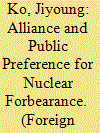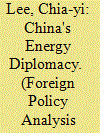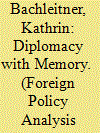|
|
|
Sort Order |
|
|
|
Items / Page
|
|
|
|
|
|
|
| Srl | Item |
| 1 |
ID:
168592


|
|
|
|
|
| Summary/Abstract |
How does a patron state dampen a client state's domestic aspirations for developing nuclear weapons? What nonproliferation tools most effectively induce a client state's domestic preference for nuclear forbearance? This article assesses the relative effectiveness of three nonproliferation tools available to a nuclear patron: a declaration of extended deterrence, forward deployment of nuclear weapons, and a conditional threat of punishment. More specifically, using experimental data on the South Korean public, this article examines whether nuclear forward-deployment and a conditional threat of punishment are more effective than a declaratory policy in enhancing the credibility of extended deterrence and curbing public aspirations for nuclearization. The experimental results show that neither nuclear forward-deployment nor a conditional threat of punishment reduces public support for nuclear armament significantly more than a declaratory policy. They also reveal that compared to when a nuclear ally does not exist, the three nonproliferation tools do not necessarily dampen the public's preference for developing indigenous nuclear weapons. The robustness of the findings is assessed using an experiment on a small sample of government officials. Taken together, this study provides the first experimental evidence on public perception of different nonproliferation tools in a client state.
|
|
|
|
|
|
|
|
|
|
|
|
|
|
|
|
| 2 |
ID:
168595


|
|
|
|
|
| Summary/Abstract |
Due to its rapid economic growth and increasing demand for energy, China has engaged in numerous efforts to sustain its energy supplies and enhance its energy security. While existing literature argues that access to energy is oftentimes the driving force behind Beijing's foreign policy behavior, little work has been done to systemically examine the bilateral relationship between China and energy-producing countries. This paper explores how China's foreign policy making is influenced by its energy security concern, focusing on three foreign policy instruments—partnerships, foreign aid, and leadership visits. Using a large-N, quantitative approach, this paper analyzes the effect of oil production on these three foreign policy indicators. The results show that Beijing is more likely to form partnerships with oil-producing countries. Top Chinese leaders are also more likely to travel to countries that produce a higher level of oil. China's aid allocation to Africa is driven by oil abundance as well, although the findings on aid are only valid in the cross-national analysis.
|
|
|
|
|
|
|
|
|
|
|
|
|
|
|
|
| 3 |
ID:
168591


|
|
|
|
|
| Summary/Abstract |
This article suggests that there exists an alternative form of international political behavior between countries who share a common traumatic past: diplomacy with memory. Diplomacy with memory manifests itself as an official, diplomatic team performance that aims at conveying a certain historic image for the purpose of achieving rational aims on the international stage. In a first step, a theoretical and empirical framework is developed that highlights diplomacy with memory as a strategic diplomatic action that does not conform with mainstream IR models of state behavior. In a second step, the new theoretical model is tested on two selected postconflict scenarios: The bilateral negotiations between West Germany and Israel, and between Austria and Israel about eventual reparation payments to the Jewish state in the early 1950s. Extracting the core elements of the diplomacy with memory from these historical examples, this paper suggests amending the toolkit of traditional diplomatic strategies with memory in order to better explain state behavior in other postconflict situations as they emerge.
|
|
|
|
|
|
|
|
|
|
|
|
|
|
|
|
| 4 |
ID:
168593


|
|
|
|
|
| Summary/Abstract |
Scholarship on US foreign policy regularly claims that US democracy promotion policy is informed by a coherent and harmonious set of basic premises. In this article, I first examine the validity of this claim for US post–Cold War administrations. I find operational in US foreign policy rhetoric three stable premises: that democracy is a universal(ly aspired to) principle, that external democracy promoters are legitimately involving themselves in another country's political affairs, and that this policy endeavor is in the best interest of all involved stakeholders. Following theoretical expectations that culture and cultural aspects are relatively stable and adaptable entities and promote stability in behavior, I then pursue the question of how these premises have fared in an environment particularly challenging to their validity, namely in the case of US democracy promotion in Egypt. I show how, even in light of contradictory evidence, the basic premises remain resilient and function as a discursive structure that enables and constrains policy options.
|
|
|
|
|
|
|
|
|
|
|
|
|
|
|
|
| 5 |
ID:
168594


|
|
|
|
|
| Summary/Abstract |
Most IR scholars attribute changes in foreign-policy strategic planning to shifts in interests, capabilities, alliances, norms, knowledge, and context. Even those studies focusing on social learning as a driver for policy change mostly underestimate the role of international legitimacy dynamics in influencing learning processes. This paper seeks to bridge the gap between theory and practice by building on David Ausubel's theory of meaningful learning to address the Gaza Flotilla crisis as a paradigmatic case of legitimacy learning. This tragic incident, which occurred in May 2010, deepened the diplomatic crisis between Israel and Turkey, until their official reconciliation in June 2016. Likewise, it led to growing delegitimization of Israel among several global audiences. Having internalized the magnitude of the political damage that this incident caused and the need to subordinate operational decisions to legitimation considerations, Israel sought to tackle similar future challenges through reforms in numerous issue-areas relating to foreign-policy strategic planning: diplomatic, military, communications, intelligence, technological, and humanitarian. Drawing on testimonies of Israeli policymakers and the reports published by committees appointed to examine the flotilla events, this phenomenological study describes Israel's meaningful learning process, tracing the subsequent development of delegitimatzia (“delegitimation”) as an advance organizer among Israeli governmental and nongovernmental institutions. These findings can serve scholars in outlining a broader research agenda for analyzing how different actors adapt to the battles for legitimacy that characterize contemporary global politics.
|
|
|
|
|
|
|
|
|
|
|
|
|
|
|
|
| 6 |
ID:
168589


|
|
|
|
|
| Summary/Abstract |
It is a common—often stereotypical—presumption that Europe is secular and America religious. Differences in international religious freedom and religious engagement policies on both sides of the Atlantic seem to confirm this “cliché.” This article argues that to understand why it has been easier for American supporters to institutionalize these policies than for advocates in the EU, it is important to consider the discursive structures of EU and US foreign policies, which enable and constrain political language and behavior. Based on the analysis of foreign policy documents, produced by the EU and the United States in their relationship with six religiously diverse African and Asian states, the article compares how both international actors represent religion in their foreign affairs. The analysis reveals similarities in the relatively low importance that they attribute to religion and major differences in how they represent the contribution of religion to creating and solving problems in other states. In sum, the foreign policies of both international actors are based on a secular discursive structure, but that of the United States is much more accommodative toward religion, including Islam, than that of the EU.
|
|
|
|
|
|
|
|
|
|
|
|
|
|
|
|
| 7 |
ID:
168590


|
|
|
|
|
| Summary/Abstract |
How do states’ desires to perform an international-societal role interact with the imperative to safeguard their security in an anarchic international system? Using the case of the contemporary United Kingdom, this article explores the tensions between roleplay and realpolitik—gaining social recognition as a particular kind of state while doing what it takes to survive—through one key role conception, “Great Power.” Recent scholarship has dubbed Britain a “residual Great Power”: lacking the wherewithal to impose regional order through preponderance, it is still cast into the role of militarized international order-upholder by the allies whose support is necessary for such role-sustainment, America and France. Yet this role-based approach sets a different threshold on capability than the requirement to undertake survival-essential military missions, independent of potentially unreliable allies’ charity—realists’ understanding of “great power.” Theoretically, therefore, the article demonstrates that roleplay and realpolitik remain separate incentive structures underlying states’ foreign policy choices. Empirically, meanwhile, the article shows—through opportunity-cost force-posture analysis—that contemporary Britain is torn between the logics. Striving for independent self-protection capabilities, above-and-beyond the “residual power” criterion, London nonetheless makes a residual power's implicit assumptions about alliance support in the deployment of those capabilities.
|
|
|
|
|
|
|
|
|
|
|
|
|
|
|
|
| 8 |
ID:
168596


|
|
|
|
|
| Summary/Abstract |
This study investigates the relationship between US strikes targeting Al-Shabaab and civilian victimization using spatially disaggregated data. We find that US strikes make it approximately 5.5 times more likely that civilians are murdered—an effect that is comparable to battles and periods of territorial loss. Disaggregating based on the target of each strike, however, reveals a more nuanced relationship: strikes that destroy Al-Shabaab military assets are associated with more civilian killings, whereas there is some evidence that strikes that kill members significantly reduce this form of violence. This implies an ability of the United States to continue current policy while also minimizing the human costs that directly result from intervention. Notably, however, this would require a policy-shift that avoids destroying Al-Shabaab's war-fighting capabilities, thereby reducing the ability of the United States to undermine the organization's capacity to wage war.
|
|
|
|
|
|
|
|
|
|
|
|
|
|
|
|
|
|
|
|
|